- Home
- Arthur Conan Doyle
The Poison Belt Page 2
The Poison Belt Read online
Page 2
Chapter II
THE TIDE OF DEATH
As we crossed the hall the telephone-bell rang, and we were theinvoluntary auditors of Professor Challenger's end of the ensuingdialogue. I say "we," but no one within a hundred yards could havefailed to hear the booming of that monstrous voice, which reverberatedthrough the house. His answers lingered in my mind.
"Yes, yes, of course, it is I.... Yes, certainly, _the_ ProfessorChallenger, the famous Professor, who else?... Of course, every word ofit, otherwise I should not have written it.... I shouldn't besurprised.... There is every indication of it.... Within a day or so atthe furthest.... Well, I can't help that, can I?... Very unpleasant, nodoubt, but I rather fancy it will affect more important people than you.There is no use whining about it.... No, I couldn't possibly. You musttake your chance.... That's enough, sir. Nonsense! I have somethingmore important to do than to listen to such twaddle."
He shut off with a crash and led us upstairs into a large airy apartmentwhich formed his study. On the great mahogany desk seven or eightunopened telegrams were lying.
"Really," he said as he gathered them up, "I begin to think that it wouldsave my correspondents' money if I were to adopt a telegraphic address.Possibly 'Noah, Rotherfield,' would be the most appropriate."
As usual when he made an obscure joke, he leaned against the desk andbellowed in a paroxysm of laughter, his hands shaking so that he couldhardly open the envelopes.
"Noah! Noah!" he gasped, with a face of beetroot, while Lord John and Ismiled in sympathy and Summerlee, like a dyspeptic goat, wagged his headin sardonic disagreement. Finally Challenger, still rumbling andexploding, began to open his telegrams. The three of us stood in the bowwindow and occupied ourselves in admiring the magnificent view.
It was certainly worth looking at. The road in its gentle curves hadreally brought us to a considerable elevation--seven hundred feet, as weafterwards discovered. Challenger's house was on the very edge of thehill, and from its southern face, in which was the study window, onelooked across the vast stretch of the weald to where the gentle curves ofthe South Downs formed an undulating horizon. In a cleft of the hills ahaze of smoke marked the position of Lewes. Immediately at our feetthere lay a rolling plain of heather, with the long, vivid greenstretches of the Crowborough golf course, all dotted with the players. Alittle to the south, through an opening in the woods, we could see asection of the main line from London to Brighton. In the immediateforeground, under our very noses, was a small enclosed yard, in whichstood the car which had brought us from the station.
An ejaculation from Challenger caused us to turn. He had read histelegrams and had arranged them in a little methodical pile upon hisdesk. His broad, rugged face, or as much of it as was visible over thematted beard, was still deeply flushed, and he seemed to be under theinfluence of some strong excitement.
"Well, gentlemen," he said, in a voice as if he was addressing a publicmeeting, "this is indeed an interesting reunion, and it takes place underextraordinary--I may say unprecedented--circumstances. May I ask if youhave observed anything upon your journey from town?"
"The only thing which I observed," said Summerlee with a sour smile, "wasthat our young friend here has not improved in his manners during theyears that have passed. I am sorry to state that I have had to seriouslycomplain of his conduct in the train, and I should be wanting infrankness if I did not say that it has left a most unpleasant impressionin my mind."
"Well, well, we all get a bit prosy sometimes," said Lord John. "Theyoung fellah meant no real harm. After all, he's an International, so ifhe takes half an hour to describe a game of football he has more right todo it than most folk."
"Half an hour to describe a game!" I cried indignantly. "Why, it was youthat took half an hour with some long-winded story about a buffalo.Professor Summerlee will be my witness."
"I can hardly judge which of you was the most utterly wearisome," saidSummerlee. "I declare to you, Challenger, that I never wish to hear offootball or of buffaloes so long as I live."
"I have never said one word to-day about football," I protested.
Lord John gave a shrill whistle, and Summerlee shook his head sadly.
"So early in the day too," said he. "It is indeed deplorable. As I satthere in sad but thoughtful silence----"
"In silence!" cried Lord John. "Why, you were doin' a music-hall turn ofimitations all the way--more like a runaway gramophone than a man."
Summerlee drew himself up in bitter protest.
"You are pleased to be facetious, Lord John," said he with a face ofvinegar.
"Why, dash it all, this is clear madness," cried Lord John. "Each of usseems to know what the others did and none of us knows what he didhimself. Let's put it all together from the first. We got into afirst-class smoker, that's clear, ain't it? Then we began to quarrelover friend Challenger's letter in the Times."
"Oh, you did, did you?" rumbled our host, his eyelids beginning to droop.
"You said, Summerlee, that there was no possible truth in his contention."
"Dear me!" said Challenger, puffing out his chest and stroking his beard."No possible truth! I seem to have heard the words before. And may Iask with what arguments the great and famous Professor Summerleeproceeded to demolish the humble individual who had ventured to expressan opinion upon a matter of scientific possibility? Perhaps before heexterminates that unfortunate nonentity he will condescend to give somereasons for the adverse views which he has formed."
He bowed and shrugged and spread open his hands as he spoke with hiselaborate and elephantine sarcasm.
"The reason was simple enough," said the dogged Summerlee. "I contendedthat if the ether surrounding the earth was so toxic in one quarter thatit produced dangerous symptoms, it was hardly likely that we three in therailway carriage should be entirely unaffected."
The explanation only brought uproarious merriment from Challenger. Helaughed until everything in the room seemed to rattle and quiver.
"Our worthy Summerlee is, not for the first time, somewhat out of touchwith the facts of the situation," said he at last, mopping his heatedbrow. "Now, gentlemen, I cannot make my point better than by detailingto you what I have myself done this morning. You will the more easilycondone any mental aberration upon your own part when you realize thateven I have had moments when my balance has been disturbed. We have hadfor some years in this household a housekeeper--one Sarah, with whosesecond name I have never attempted to burden my memory. She is a womanof a severe and forbidding aspect, prim and demure in her bearing, veryimpassive in her nature, and never known within our experience to showsigns of any emotion. As I sat alone at my breakfast--Mrs. Challenger isin the habit of keeping her room of a morning--it suddenly entered myhead that it would be entertaining and instructive to see whether I couldfind any limits to this woman's inperturbability. I devised a simple buteffective experiment. Having upset a small vase of flowers which stoodin the centre of the cloth, I rang the bell and slipped under the table.She entered and, seeing the room empty, imagined that I had withdrawn tothe study. As I had expected, she approached and leaned over the tableto replace the vase. I had a vision of a cotton stocking and anelastic-sided boot. Protruding my head, I sank my teeth into the calf ofher leg. The experiment was successful beyond belief. For some momentsshe stood paralyzed, staring down at my head. Then with a shriek shetore herself free and rushed from the room. I pursued her with somethoughts of an explanation, but she flew down the drive, and some minutesafterwards I was able to pick her out with my field-glasses travellingvery rapidly in a south-westerly direction. I tell you the anecdote forwhat it is worth. I drop it into your brains and await its germination.Is it illuminative? Has it conveyed anything to your minds? What do_you_ think of it, Lord John?"
Lord John shook his head gravely.
"You'll be gettin' into serious trouble some of these days if you don'tput a brake on," said he.
"Perhaps yo
u have some observation to make, Summerlee?"
"You should drop all work instantly, Challenger, and take three months ina German watering-place," said he.
"Profound! Profound!" cried Challenger. "Now, my young friend, is itpossible that wisdom may come from you where your seniors have sosignally failed?"
And it did. I say it with all modesty, but it did. Of course, it allseems obvious enough to you who know what occurred, but it was not sovery clear when everything was new. But it came on me suddenly with thefull force of absolute conviction.
"Poison!" I cried.
Then, even as I said the word, my mind flashed back over the wholemorning's experiences, past Lord John with his buffalo, past my ownhysterical tears, past the outrageous conduct of Professor Summerlee, tothe queer happenings in London, the row in the park, the driving of thechauffeur, the quarrel at the oxygen warehouse. Everything fittedsuddenly into its place.
"Of course," I cried again. "It is poison. We are all poisoned."
"Exactly," said Challenger, rubbing his hands, "we are all poisoned. Ourplanet has swum into the poison belt of ether, and is now flying deeperinto it at the rate of some millions of miles a minute. Our young friendhas expressed the cause of all our troubles and perplexities in a singleword, 'poison.'"
We looked at each other in amazed silence. No comment seemed to meet thesituation.
"There is a mental inhibition by which such symptoms can be checked andcontrolled," said Challenger. "I cannot expect to find it developed inall of you to the same point which it has reached in me, for I supposethat the strength of our different mental processes bears some proportionto each other. But no doubt it is appreciable even in our young friendhere. After the little outburst of high spirits which so alarmed mydomestic I sat down and reasoned with myself. I put it to myself that Ihad never before felt impelled to bite any of my household. The impulsehad then been an abnormal one. In an instant I perceived the truth. Mypulse upon examination was ten beats above the usual, and my reflexeswere increased. I called upon my higher and saner self, the real G. E.C., seated serene and impregnable behind all mere molecular disturbance.I summoned him, I say, to watch the foolish mental tricks which thepoison would play. I found that I was indeed the master. I couldrecognize and control a disordered mind. It was a remarkable exhibitionof the victory of mind over matter, for it was a victory over thatparticular form of matter which is most intimately connected with mind.I might almost say that mind was at fault and that personality controlledit. Thus, when my wife came downstairs and I was impelled to slip behindthe door and alarm her by some wild cry as she entered, I was able tostifle the impulse and to greet her with dignity and restraint. Anoverpowering desire to quack like a duck was met and mastered in the samefashion.
"Later, when I descended to order the car and found Austin bending overit absorbed in repairs, I controlled my open hand even after I had liftedit and refrained from giving him an experience which would possibly havecaused him to follow in the steps of the housekeeper. On the contrary, Itouched him on the shoulder and ordered the car to be at the door in timeto meet your train. At the present instant I am most forcibly tempted totake Professor Summerlee by that silly old beard of his and to shake hishead violently backwards and forwards. And yet, as you see, I amperfectly restrained. Let me commend my example to you."
"I'll look out for that buffalo," said Lord John.
"And I for the football match."
"It may be that you are right, Challenger," said Summerlee in a chastenedvoice. "I am willing to admit that my turn of mind is critical ratherthan constructive and that I am not a ready convert to any new theory,especially when it happens to be so unusual and fantastic as this one.However, as I cast my mind back over the events of the morning, and as Ireconsider the fatuous conduct of my companions, I find it easy tobelieve that some poison of an exciting kind was responsible for theirsymptoms."
Challenger slapped his colleague good-humouredly upon the shoulder. "Weprogress," said he. "Decidedly we progress."
"And pray, sir," asked Summerlee humbly, "what is your opinion as to thepresent outlook?"
"With your permission I will say a few words upon that subject." Heseated himself upon his desk, his short, stumpy legs swinging in front ofhim. "We are assisting at a tremendous and awful function. It is, in myopinion, the end of the world."
The end of the world! Our eyes turned to the great bow-window and welooked out at the summer beauty of the country-side, the long slopes ofheather, the great country-houses, the cozy farms, the pleasure-seekersupon the links.
The end of the world! One had often heard the words, but the idea thatthey could ever have an immediate practical significance, that it shouldnot be at some vague date, but now, to-day, that was a tremendous, astaggering thought. We were all struck solemn and waited in silence forChallenger to continue. His overpowering presence and appearance lentsuch force to the solemnity of his words that for a moment all thecrudities and absurdities of the man vanished, and he loomed before us assomething majestic and beyond the range of ordinary humanity. Then tome, at least, there came back the cheering recollection of how twicesince we had entered the room he had roared with laughter. Surely, Ithought, there are limits to mental detachment. The crisis cannot be sogreat or so pressing after all.
"You will conceive a bunch of grapes," said he, "which are covered bysome infinitesimal but noxious bacillus. The gardener passes it througha disinfecting medium. It may be that he desires his grapes to becleaner. It may be that he needs space to breed some fresh bacillus lessnoxious than the last. He dips it into the poison and they are gone.Our Gardener is, in my opinion, about to dip the solar system, and thehuman bacillus, the little mortal vibrio which twisted and wriggled uponthe outer rind of the earth, will in an instant be sterilized out ofexistence."
Again there was silence. It was broken by the high trill of thetelephone-bell.
"There is one of our bacilli squeaking for help," said he with a grimsmile. "They are beginning to realize that their continued existence isnot really one of the necessities of the universe."
He was gone from the room for a minute or two. I remember that none ofus spoke in his absence. The situation seemed beyond all words orcomments.
"The medical officer of health for Brighton," said he when he returned."The symptoms are for some reason developing more rapidly upon the sealevel. Our seven hundred feet of elevation give us an advantage. Folkseem to have learned that I am the first authority upon the question. Nodoubt it comes from my letter in the Times. That was the mayor of aprovincial town with whom I talked when we first arrived. You may haveheard me upon the telephone. He seemed to put an entirely inflated valueupon his own life. I helped him to readjust his ideas."
Summerlee had risen and was standing by the window. His thin, bony handswere trembling with his emotion.
"Challenger," said he earnestly, "this thing is too serious for merefutile argument. Do not suppose that I desire to irritate you by anyquestion I may ask. But I put it to you whether there may not be somefallacy in your information or in your reasoning. There is the sunshining as brightly as ever in the blue sky. There are the heather andthe flowers and the birds. There are the folk enjoying themselves uponthe golf-links and the laborers yonder cutting the corn. You tell usthat they and we may be upon the very brink of destruction--that thissunlit day may be that day of doom which the human race has so longawaited. So far as we know, you found this tremendous judgment uponwhat? Upon some abnormal lines in a spectrum--upon rumours fromSumatra--upon some curious personal excitement which we have discerned ineach other. This latter symptom is not so marked but that you and wecould, by a deliberate effort, control it. You need not stand onceremony with us, Challenger. We have all faced death together beforenow. Speak out, and let us know exactly where we stand, and what, inyour opinion, are our prospects for our future."
It was a brave, good speech, a speech from that stanch an
d strong spiritwhich lay behind all the acidities and angularities of the old zoologist.Lord John rose and shook him by the hand.
"My sentiment to a tick," said he. "Now, Challenger, it's up to you totell us where we are. We ain't nervous folk, as you know well; but whenit comes to makin' a week-end visit and finding you've run full butt intothe Day of Judgment, it wants a bit of explainin'. What's the danger,and how much of it is there, and what are we goin' to do to meet it?"
He stood, tall and strong, in the sunshine at the window, with his brownhand upon the shoulder of Summerlee. I was lying back in an armchair, anextinguished cigarette between my lips, in that sort of half-dazed statein which impressions become exceedingly distinct. It may have been a newphase of the poisoning, but the delirious promptings had all passed awayand were succeeded by an exceedingly languid and, at the same time,perceptive state of mind. I was a spectator. It did not seem to be anypersonal concern of mine. But here were three strong men at a greatcrisis, and it was fascinating to observe them. Challenger bent hisheavy brows and stroked his beard before he answered. One could see thathe was very carefully weighing his words.
"What was the last news when you left London?" he asked.
"I was at the Gazette office about ten," said I. "There was a Reuterjust come in from Singapore to the effect that the sickness seemed to beuniversal in Sumatra and that the lighthouses had not been lit inconsequence."
"Events have been moving somewhat rapidly since then," said Challenger,picking up his pile of telegrams. "I am in close touch both with theauthorities and with the press, so that news is converging upon me fromall parts. There is, in fact, a general and very insistent demand that Ishould come to London; but I see no good end to be served. From theaccounts the poisonous effect begins with mental excitement; the riotingin Paris this morning is said to have been very violent, and the Welshcolliers are in a state of uproar. So far as the evidence to hand can betrusted, this stimulative stage, which varies much in races and inindividuals, is succeeded by a certain exaltation and mental lucidity--Iseem to discern some signs of it in our young friend here--which, afteran appreciable interval, turns to coma, deepening rapidly into death. Ifancy, so far as my toxicology carries me, that there are some vegetablenerve poisons----"
"Datura," suggested Summerlee.
"Excellent!" cried Challenger. "It would make for scientific precisionif we named our toxic agent. Let it be daturon. To you, my dearSummerlee, belongs the honour--posthumous, alas, but none the lessunique--of having given a name to the universal destroyer, the GreatGardener's disinfectant. The symptoms of daturon, then, may be taken tobe such as I indicate. That it will involve the whole world and that nolife can possibly remain behind seems to me to be certain, since ether isa universal medium. Up to now it has been capricious in the places whichit has attacked, but the difference is only a matter of a few hours, andit is like an advancing tide which covers one strip of sand and thenanother, running hither and thither in irregular streams, until at lastit has submerged it all. There are laws at work in connection with theaction and distribution of daturon which would have been of deep interesthad the time at our disposal permitted us to study them. So far as I cantrace them"--here he glanced over his telegrams--"the less developedraces have been the first to respond to its influence. There aredeplorable accounts from Africa, and the Australian aborigines appear tohave been already exterminated. The Northern races have as yet showngreater resisting power than the Southern. This, you see, is dated fromMarseilles at nine-forty-five this morning. I give it to you verbatim:--
"'All night delirious excitement throughout Provence. Tumult of vinegrowers at Nimes. Socialistic upheaval at Toulon. Sudden illnessattended by coma attacked population this morning. _Peste foudroyante_.Great numbers of dead in the streets. Paralysis of business anduniversal chaos.'
"An hour later came the following, from the same source:--
"'We are threatened with utter extermination. Cathedrals and churchesfull to overflowing. The dead outnumber the living. It is inconceivableand horrible. Decease seems to be painless, but swift and inevitable.'
"There is a similar telegram from Paris, where the development is not yetas acute. India and Persia appear to be utterly wiped out. The Slavonicpopulation of Austria is down, while the Teutonic has hardly beenaffected. Speaking generally, the dwellers upon the plains and upon theseashore seem, so far as my limited information goes, to have felt theeffects more rapidly than those inland or on the heights. Even a littleelevation makes a considerable difference, and perhaps if there be asurvivor of the human race, he will again be found upon the summit ofsome Ararat. Even our own little hill may presently prove to be atemporary island amid a sea of disaster. But at the present rate ofadvance a few short hours will submerge us all."
Lord John Roxton wiped his brow.
"What beats me," said he, "is how you could sit there laughin' with thatstack of telegrams under your hand. I've seen death as often as mostfolk, but universal death--it's awful!"
"As to the laughter," said Challenger, "you will bear in mind that, likeyourselves, I have not been exempt from the stimulating cerebral effectsof the etheric poison. But as to the horror with which universal deathappears to inspire you, I would put it to you that it is somewhatexaggerated. If you were sent to sea alone in an open boat to someunknown destination, your heart might well sink within you. Theisolation, the uncertainty, would oppress you. But if your voyage weremade in a goodly ship, which bore within it all your relations and yourfriends, you would feel that, however uncertain your destination mightstill remain, you would at least have one common and simultaneousexperience which would hold you to the end in the same close communion.A lonely death may be terrible, but a universal one, as painless as thiswould appear to be, is not, in my judgment, a matter for apprehension.Indeed, I could sympathize with the person who took the view that thehorror lay in the idea of surviving when all that is learned, famous, andexalted had passed away."
"What, then, do you propose to do?" asked Summerlee, who had for oncenodded his assent to the reasoning of his brother scientist.
"To take our lunch," said Challenger as the boom of a gong soundedthrough the house. "We have a cook whose omelettes are only excelled byher cutlets. We can but trust that no cosmic disturbance has dulled herexcellent abilities. My Scharzberger of '96 must also be rescued, so faras our earnest and united efforts can do it, from what would be adeplorable waste of a great vintage." He levered his great bulk off thedesk, upon which he had sat while he announced the doom of the planet."Come," said he. "If there is little time left, there is the more needthat we should spend it in sober and reasonable enjoyment."
And, indeed, it proved to be a very merry meal. It is true that we couldnot forget our awful situation. The full solemnity of the event loomedever at the back of our minds and tempered our thoughts. But surely itis the soul which has never faced death which shies strongly from it atthe end. To each of us men it had, for one great epoch in our lives,been a familiar presence. As to the lady, she leaned upon the strongguidance of her mighty husband and was well content to go whither hispath might lead. The future was our fate. The present was our own. Wepassed it in goodly comradeship and gentle merriment. Our minds were, asI have said, singularly lucid. Even I struck sparks at times. As toChallenger, he was wonderful! Never have I so realized the elementalgreatness of the man, the sweep and power of his understanding.Summerlee drew him on with his chorus of subacid criticism, while LordJohn and I laughed at the contest and the lady, her hand upon his sleeve,controlled the bellowings of the philosopher. Life, death, fate, thedestiny of man--these were the stupendous subjects of that memorablehour, made vital by the fact that as the meal progressed strange, suddenexaltations in my mind and tinglings in my limbs proclaimed that theinvisible tide of death was slowly and gently rising around us. Once Isaw Lord John put his hand suddenly to his eyes, and once Summerleedropped back for an instant in his chair. Ea
ch breath we breathed wascharged with strange forces. And yet our minds were happy and at ease.Presently Austin laid the cigarettes upon the table and was about towithdraw.
"Austin!" said his master.
"Yes, sir?"
"I thank you for your faithful service." A smile stole over theservant's gnarled face.
"I've done my duty, sir."
"I'm expecting the end of the world to-day, Austin."
"Yes, sir. What time, sir?"
"I can't say, Austin. Before evening."
"Very good, sir."
The taciturn Austin saluted and withdrew. Challenger lit a cigarette,and, drawing his chair closer to his wife's, he took her hand in his.
"You know how matters stand, dear," said he. "I have explained it alsoto our friends here. You're not afraid are you?"
"It won't be painful, George?"
"No more than laughing-gas at the dentist's. Every time you have had ityou have practically died."
"But that is a pleasant sensation."
"So may death be. The worn-out bodily machine can't record itsimpression, but we know the mental pleasure which lies in a dream or atrance. Nature may build a beautiful door and hang it with many a gauzyand shimmering curtain to make an entrance to the new life for ourwondering souls. In all my probings of the actual, I have always foundwisdom and kindness at the core; and if ever the frightened mortal needstenderness, it is surely as he makes the passage perilous from life tolife. No, Summerlee, I will have none of your materialism, for I, atleast, am too great a thing to end in mere physical constituents, apacket of salts and three bucketfuls of water. Here--here"--and he beathis great head with his huge, hairy fist--"there is something which usesmatter, but is not of it--something which might destroy death, but whichdeath can never destroy."
"Talkin' of death," said Lord John. "I'm a Christian of sorts, but itseems to me there was somethin' mighty natural in those ancestors of ourswho were buried with their axes and bows and arrows and the like, same asif they were livin' on just the same as they used to. I don't know," headded, looking round the table in a shamefaced way, "that I wouldn't feelmore homely myself if I was put away with my old .450 Express and thefowlin'-piece, the shorter one with the rubbered stock, and a clip or twoof cartridges--just a fool's fancy, of course, but there it is. How doesit strike you, Herr Professor?"
"Well," said Summerlee, "since you ask my opinion, it strikes me as anindefensible throwback to the Stone Age or before it. I'm of thetwentieth century myself, and would wish to die like a reasonablecivilized man. I don't know that I am more afraid of death than the restof you, for I am an oldish man, and, come what may, I can't have verymuch longer to live; but it is all against my nature to sit waitingwithout a struggle like a sheep for the butcher. Is it quite certain,Challenger, that there is nothing we can do?"
"To save us--nothing," said Challenger. "To prolong our lives a fewhours and thus to see the evolution of this mighty tragedy before we areactually involved in it--that may prove to be within my powers. I havetaken certain steps----"
"The oxygen?"
"Exactly. The oxygen."
"But what can oxygen effect in the face of a poisoning of the ether?There is not a greater difference in quality between a brick-bat and agas than there is between oxygen and ether. They are different planes ofmatter. They cannot impinge upon one another. Come, Challenger, youcould not defend such a proposition."
"My good Summerlee, this etheric poison is most certainly influenced bymaterial agents. We see it in the methods and distribution of theoutbreak. We should not _a priori_ have expected it, but it isundoubtedly a fact. Hence I am strongly of opinion that a gas likeoxygen, which increases the vitality and the resisting power of the body,would be extremely likely to delay the action of what you have so happilynamed the daturon. It may be that I am mistaken, but I have everyconfidence in the correctness of my reasoning."
"Well," said Lord John, "if we've got to sit suckin' at those tubes likeso many babies with their bottles, I'm not takin' any."
"There will be no need for that," Challenger answered. "We have madearrangements--it is to my wife that you chiefly owe it--that her boudoirshall be made as airtight as is practicable. With matting and varnishedpaper."
"Good heavens, Challenger, you don't suppose you can keep out ether withvarnished paper?"
"Really, my worthy friend, you are a trifle perverse in missing thepoint. It is not to keep out the ether that we have gone to suchtrouble. It is to keep in the oxygen. I trust that if we can ensure anatmosphere hyper-oxygenated to a certain point, we may be able to retainour senses. I had two tubes of the gas and you have brought me threemore. It is not much, but it is something."
"How long will they last?"
"I have not an idea. We will not turn them on until our symptoms becomeunbearable. Then we shall dole the gas out as it is urgently needed. Itmay give us some hours, possibly even some days, on which we may look outupon a blasted world. Our own fate is delayed to that extent, and wewill have the very singular experience, we five, of being, in allprobability, the absolute rear guard of the human race upon its marchinto the unknown. Perhaps you will be kind enough now to give me a handwith the cylinders. It seems to me that the atmosphere already growssomewhat more oppressive."

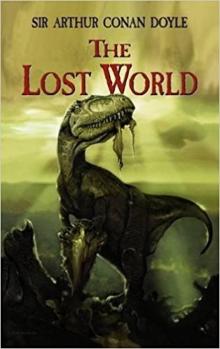 The Lost World
The Lost World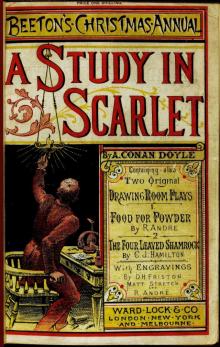 A Study in Scarlet
A Study in Scarlet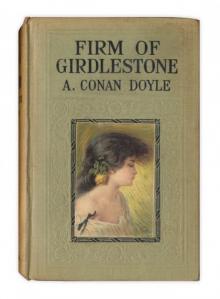 The Firm of Girdlestone
The Firm of Girdlestone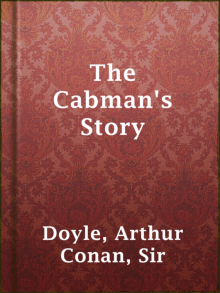 The Cabman's Story
The Cabman's Story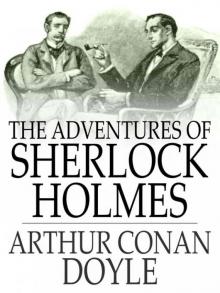 The Adventures of Sherlock Holmes
The Adventures of Sherlock Holmes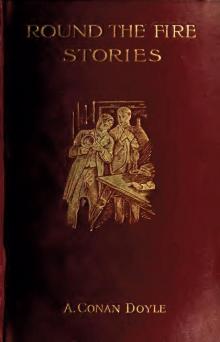 Round the Fire Stories
Round the Fire Stories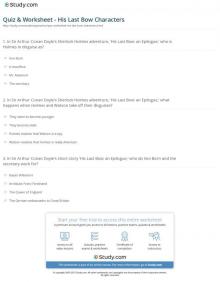 His Last Bow: An Epilogue of Sherlock Holmes
His Last Bow: An Epilogue of Sherlock Holmes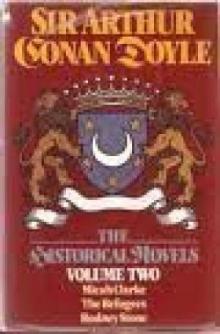 Micah Clarke
Micah Clarke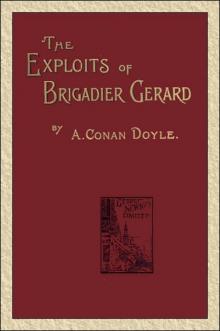 The Exploits of Brigadier Gerard
The Exploits of Brigadier Gerard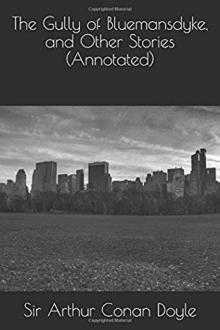 The Gully of Bluemansdyke, and Other stories
The Gully of Bluemansdyke, and Other stories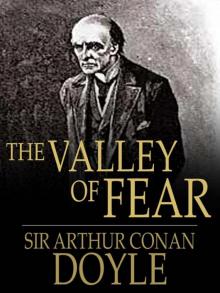 The Valley of Fear
The Valley of Fear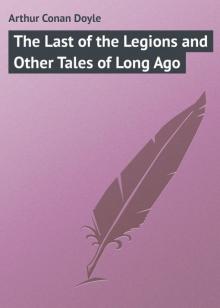 The Last of the Legions and Other Tales of Long Ago
The Last of the Legions and Other Tales of Long Ago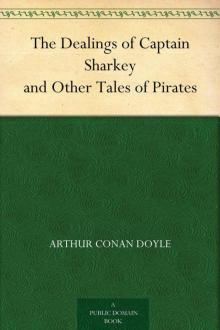 The Dealings of Captain Sharkey, and Other Tales of Pirates
The Dealings of Captain Sharkey, and Other Tales of Pirates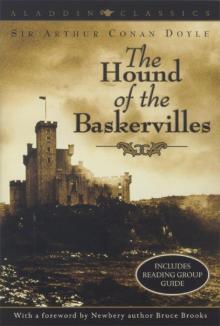 The Hound of the Baskervilles
The Hound of the Baskervilles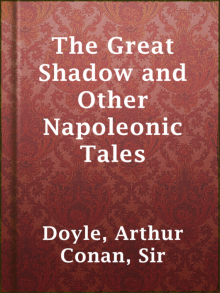 The Great Shadow and Other Napoleonic Tales
The Great Shadow and Other Napoleonic Tales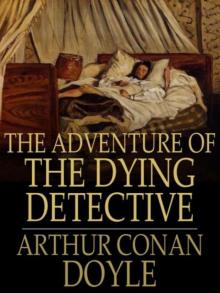 The Adventure of the Dying Detective
The Adventure of the Dying Detective The Man from Archangel, and Other Tales of Adventure
The Man from Archangel, and Other Tales of Adventure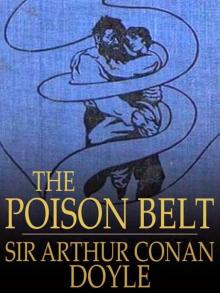 The Poison Belt
The Poison Belt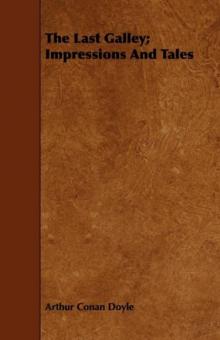 The Last Galley; Impressions and Tales
The Last Galley; Impressions and Tales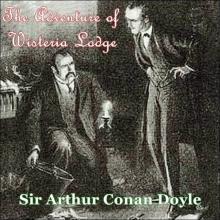 The Adventure of Wisteria Lodge
The Adventure of Wisteria Lodge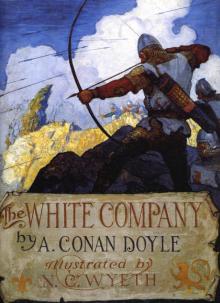 The White Company
The White Company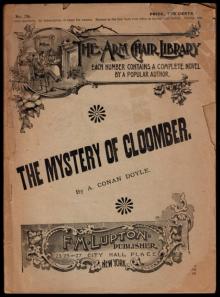 The Mystery of Cloomber
The Mystery of Cloomber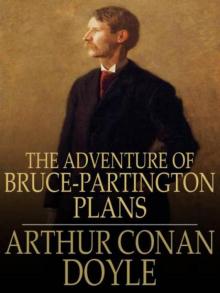 The Adventure of the Bruce-Partington Plans
The Adventure of the Bruce-Partington Plans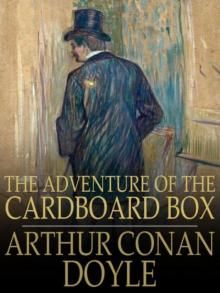 The Adventure of the Cardboard Box
The Adventure of the Cardboard Box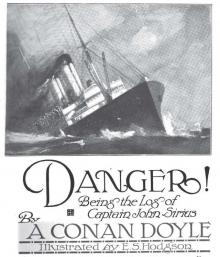 Danger! and Other Stories
Danger! and Other Stories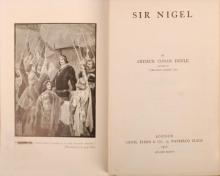 Sir Nigel
Sir Nigel The Return of Sherlock Holmes
The Return of Sherlock Holmes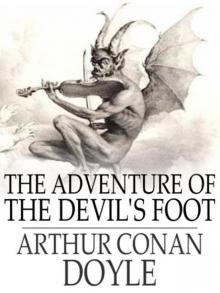 The Adventure of the Devil's Foot
The Adventure of the Devil's Foot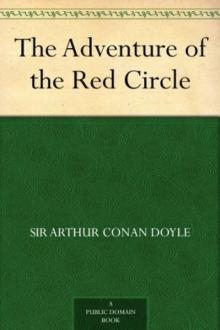 The Adventure of the Red Circle
The Adventure of the Red Circle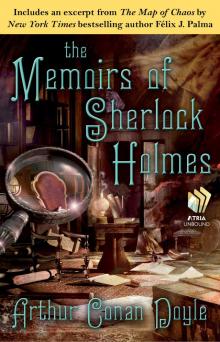 The Memoirs of Sherlock Holmes
The Memoirs of Sherlock Holmes The Adventure of the Yellow Face
The Adventure of the Yellow Face The Adventure of the Norwood Builder
The Adventure of the Norwood Builder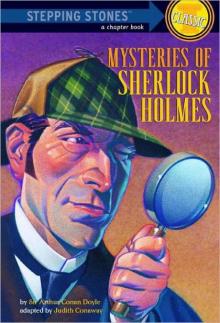 Mysteries of Sherlock Holmes
Mysteries of Sherlock Holmes The Adventure of the Missing Three-Quarter
The Adventure of the Missing Three-Quarter The Adventure of the Final Problem
The Adventure of the Final Problem A Scandal in Bohemia
A Scandal in Bohemia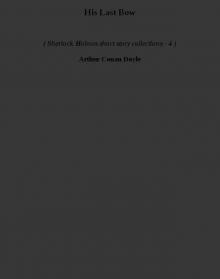 His Last Bow shssc-4
His Last Bow shssc-4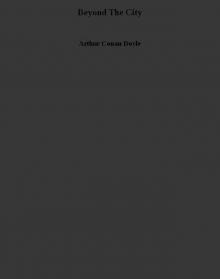 Beyond The City
Beyond The City The Adventure of the Gloria Scott
The Adventure of the Gloria Scott The Parasite
The Parasite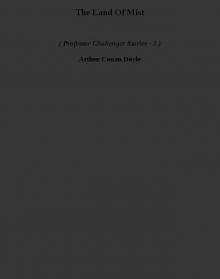 The Land Of Mist pcs-3
The Land Of Mist pcs-3 The Adventure of the Musgrave Ritual
The Adventure of the Musgrave Ritual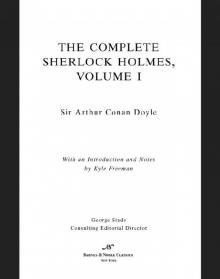 The Complete Sherlock Holmes, Volume I (Barnes & Noble Classics Series)
The Complete Sherlock Holmes, Volume I (Barnes & Noble Classics Series) The Adventure of the Stockbroker's Clerk
The Adventure of the Stockbroker's Clerk The Adventure of the Copper Beeches
The Adventure of the Copper Beeches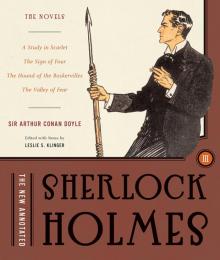 The New Annotated Sherlock Holmes
The New Annotated Sherlock Holmes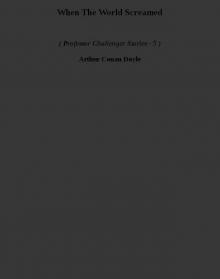 When The World Screamed pcs-5
When The World Screamed pcs-5 The Adventure of the Six Napoleons
The Adventure of the Six Napoleons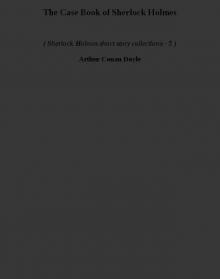 The Case Book of Sherlock Holmes shssc-5
The Case Book of Sherlock Holmes shssc-5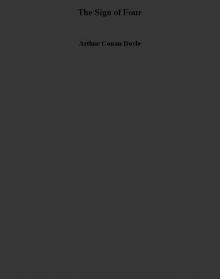 The Sign of Four
The Sign of Four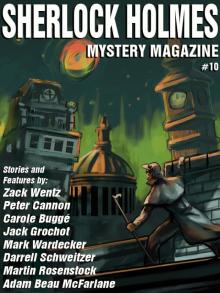 Sherlock Holmes Mystery Magazine #10
Sherlock Holmes Mystery Magazine #10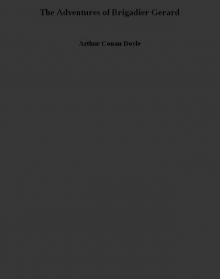 The Adventures of Brigadier Gerard
The Adventures of Brigadier Gerard The Adventure of the Second Stain
The Adventure of the Second Stain The Adventure of the Engineer's Thumb
The Adventure of the Engineer's Thumb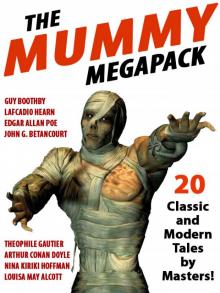 The Mummy Megapack
The Mummy Megapack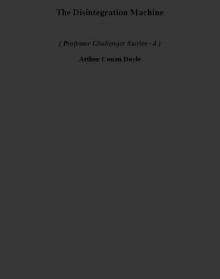 The Disintegration Machine pcs-4
The Disintegration Machine pcs-4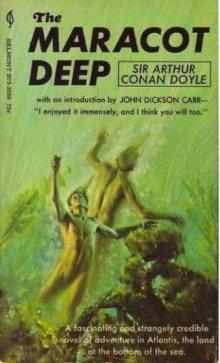 The Maracot Deep
The Maracot Deep The Five Orange Pips
The Five Orange Pips The Adventure of the Crooked Man
The Adventure of the Crooked Man The Adventure of the Blue Carbuncle
The Adventure of the Blue Carbuncle The Adventure of Silver Blaze
The Adventure of Silver Blaze The Adventure of the Solitary Cyclist
The Adventure of the Solitary Cyclist The Adventure of the Naval Treaty
The Adventure of the Naval Treaty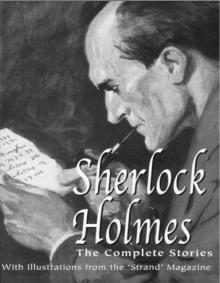 Sherlock Holmes. The Complete Stories
Sherlock Holmes. The Complete Stories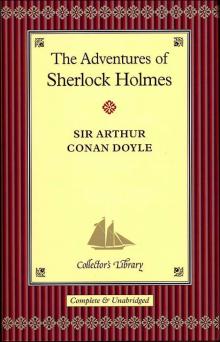 The Adventures of Sherlock Holmes (sherlock holmes)
The Adventures of Sherlock Holmes (sherlock holmes) The Adventure of the Empty House
The Adventure of the Empty House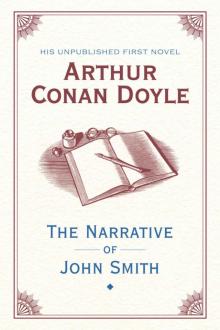 The Narrative of John Smith
The Narrative of John Smith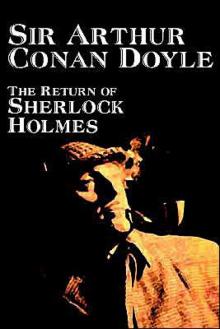 The Return of Sherlock Holmes (sherlock holmes)
The Return of Sherlock Holmes (sherlock holmes) The New Revelation
The New Revelation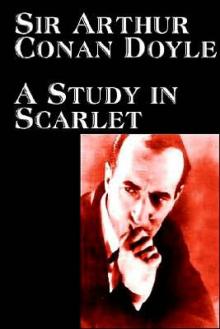 A Study in Scarlet (sherlock holmes)
A Study in Scarlet (sherlock holmes) The Vital Message
The Vital Message Sherlock Holmes Complete Collection
Sherlock Holmes Complete Collection Round the Red Lamp
Round the Red Lamp The Boscombe Valley Mystery
The Boscombe Valley Mystery The Adventure of the Beryl Coronet
The Adventure of the Beryl Coronet The Refugees
The Refugees The Adventure of the Three Students.
The Adventure of the Three Students.